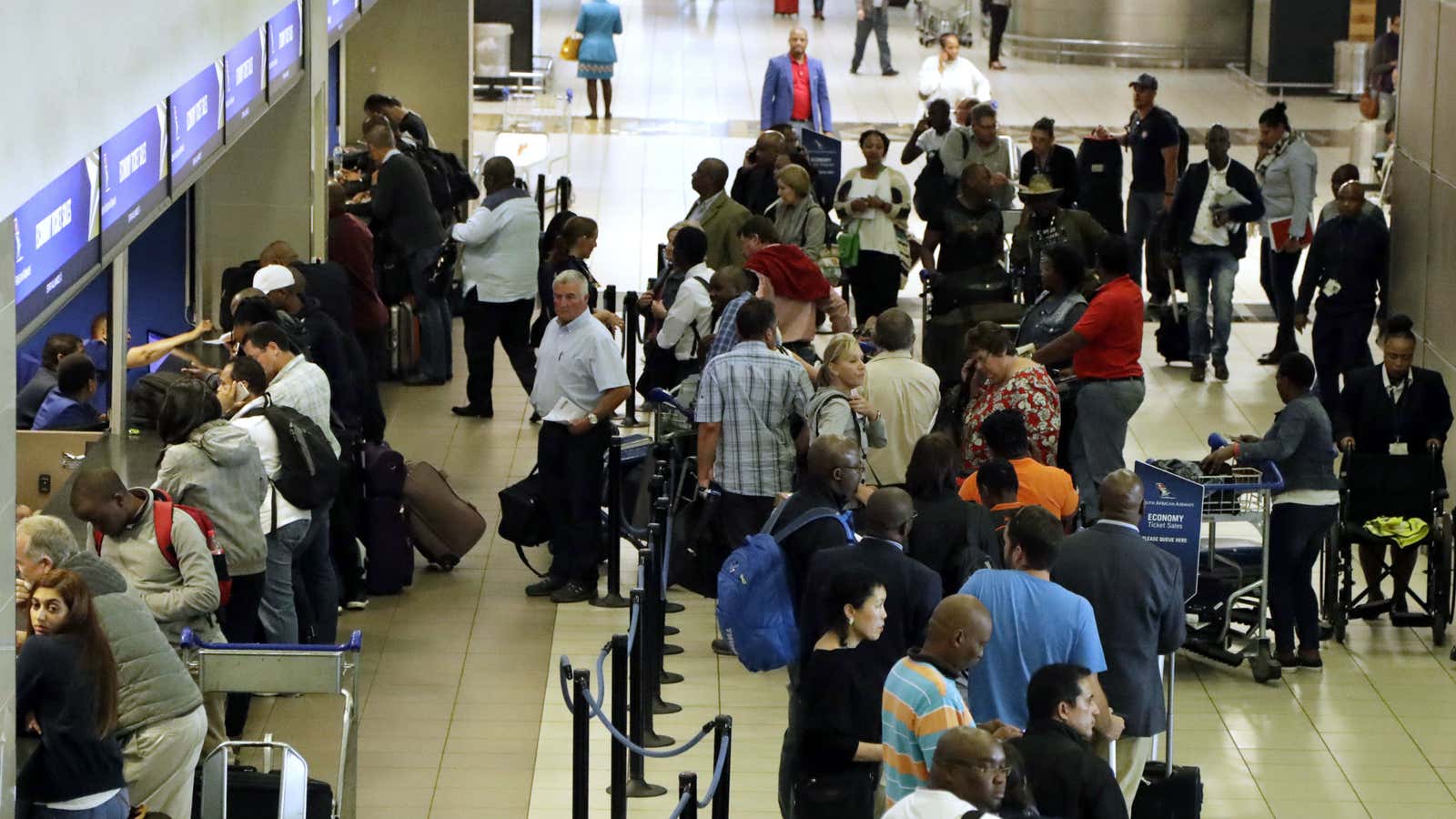The implementation of the Africa Continental Free Trade Area (AfCFTA) and a Single Air Transport Market a few years ago was expected to have eased travel for Africans across the continent. While there have been some improvements, the majority of Africans still need visas to travel around the continent.
Cameroon—this year’s host of the just concluded Africa Cup of Nations (Afcon)—ranks 41st on the 2021 Africa Visa Openness Report (pdf), with nationals from 46 African countries requiring visas in advance to visit the country. The experiences of African journalists who traveled to the country to cover the event reveal the challenges of intra-Africa travel.
In the case of Nigerians, a 90-day visa free access and a new direct flight route from Lagos to Douala removed only a few layers from the eerily familiar harsh, expensive experience Africans grapple with when they travel on the continent.
“Traveling to Cameroon, especially for this Afcon, was a bit tedious. First off, there’s only one solid airport because that’s the only airport that can accommodate almost all international airlines which is in Douala” says Rotimi Akindele, a Nigerian journalist.
“This means if you’re going anywhere in Cameroon, including Yaounde (the capital), you first have to make a stop in Douala before you now have to connect to where you’re headed.”
Logistical challenges during Afcon went beyond visa issues
Had Nigeria gotten to the semifinals at the just concluded 2021 African Cup of Nations, fans and journalists would have had to renegotiate their jubilant celebrations.
“[We were] already concerned about that,” says Babatunde Ojora, a Paris-based Nigerian journalist covering the competition.
Nigeria, in Group D alongside Egypt, Sudan, and Guinea-Bissau, stayed in Garoua, the capital of the North region of Cameroon. And till the quarterfinals, games were played at the Roumdé Adjia Stadium and semi-finalists moved to the capital city Yaounde. Fans and journalists willing to witness the games live would have to find their way there.
Camair-Co, a government-owned airline, solely services the entire country and according to Akindele, even during a tournament with Afcon’s magnitude, flights only left from Douala to Garoua once a week and “they had to start prioritizing. ‘These are Caf [Confederation of African Football] executives, only Caf executives can fly to this particular region today. You can come back tomorrow.'”
“So that’s how bad it was. And then when you eventually get a seat on the plane to take you to that city, you’re paying through your nose. It’s expensive.”
The other means from Douala to Garoua was going either by road or rail. No amount of glee and camaraderie around the soccer pitches in Cameroon during Afcon was enough to escape the trials of using the country’s atrocious transportation system – something that is unfortunately way too common in many African countries.
“Some people tried it but it lasted 36 hours. 36 hours in a country I’m meant to be a foreigner or guest,” Akindele told Quartz.
Ojora, who missed the weekly flight from Douala to Garoua, made do with the train, spending over 23 hours and, thus, missing a game.
Visa challenges have been an issue even in previous Afcon tournaments
For the 2019 edition, Cameroon was stripped of hosting rights after it appeared they were not ready to host a 24-team soccer championship and had to be moved to the 2021 edition. With the covid-19 pandemic, it was shifted to this year but they still to convince football authorities about their capabilities, especially about curbing the disease.
Logistical challenges however seem to have been overlooked. Nigerian fans and journalists had to navigate arduous routes to the port city. The exception was the Super Eagles as administrators and politicians chartered a direct flight from the country’s capital Abuja.
Egypt, the makeshift host of the 2019 edition, had a stern bureaucratic process for visa application that had fans and journalists miss out on the tournament, altogether. For this edition though, Caf sent the names of all accredited journalists to the Cameroonian embassy to allow for easy entry.
Nigeria is one of the seven countries granted visa-free access in the country, the others being Central Africa Republic, Chad, Equatorial Guinea, Gabon, Mali, and Republic of Congo. This left fans from other countries dealing with visa-related issues and it’s very likely that many chose not to travel given the additional strain of traveling during the pandemic.
Nigeria shares borders with Cameroon and as a result, both countries have other means of traveling. These old but familiar routes were explored as options to experience the Super Eagles at Cameroon’s port city. Emmanuel Sebastian, a football presenter, told Quartz “Boat is faster if you’re not afraid of water and the road is bumpy and dusty.”
A two-day journey. It required two flights from Lagos; one to Abuja, then to Yola before departing for Garoua via a four-hour boat ride—inclusive of “all the checkpoint stops with passport stamps and everything, done on the water”—on the second day. On getting to Garoua, another two-hour bus ride to the stadium. “Because there’s no direct flight from Lagos to Garoua. It is cheaper and faster,” he added.
Ayodeji Adegbenro, a Nigerian football administrator, was at the Paul Biya Stadium in Yaounde to witness Senegal crowned champions of Africa on Sunday. He arrived in Cameroon on Wednesday (Feb. 3) just to witness the final two games of the competition. It was a strategic decision, even if it meant not witnessing his country Nigeria at all at the competition. Cutting away the stress of traveling to Garoua to watch them earlier in the competition, he said, was key for him.
“I flew from Lagos straight to Douala and (traveled) by road to Yaounde (about 4 hours). It was a bit easier for me,” he said.
Sign up to the Quartz Africa Weekly Brief here for news and analysis on African business, tech, and innovation in your inbox.
